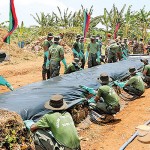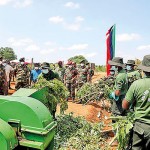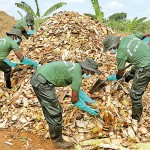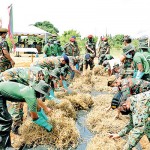News
Army digs in for organic in Jaffna as Maha approaches
View(s):Tasked with producing 25,000 tonnes of organic fertiliser for the Maha harvest starting in two months, the army is in full-scale production with organic fertiliser plants set up in army camps in the North.
The plants are aimed at meeting local demand as well as the needs of the army’s own vegetable farms, which are ramping up production to help achieve the government’s aim of a self-sufficient agro-economy.
The government’s recent ban on chemical fertiliser, blamed for causing harm to the environment and the health of rural communities, caused consternation among farmers at a loss for alternatives.
Now the army has swung into action, and at camps across the north, soldiers are busy collecting cow dung, poultry litter and compost to meet the target.
“It is a challenging task but we are up for it since it is a national initiative taken by the government for the benefit of farmers and to encourage them to engage in environmentally-friendly organic farming practices in the future,” Brigadier Arosh Rajapaksha, head of the army’s Directorate of Agriculture and Livestock, told the Sunday Times.
The initiative will come as a relief to farmers as prices of organic fertilisers have been on the rise in recent weeks.
A tractor-load of cow dung-mixed compost that was Rs. 15,000 three weeks ago now fetches Rs. 45,000-60,000 in the north, and demand is increasing as farmers prepare their land for the next season.
In Vavuniya, where the military is running three major farms over 200 acres, military personnel and Civil Security Force employees are hard at work.
Harvesting has begun at army farms in Kandakadu and Menik Farm in Vavuniya and Andiyapuliyankulam, where chillies have been grown on 100 acres to produce dried chillies through a Rs. 80 million funding package.
The first harvest of one metric tonne of chillies was recently symbolically presented to visiting State Minister Janaka Wakkumbura.
The dried chilli stocks will be sold to the public through state-owned chains such as Sathosa and co-operative branches.
In Jaffna, locals have mixed feelings about the military-run farms in Tellipalai, Kankesanturai (KKS) and Palaly as most of the farmland belongs to locals and are yet to be returned to them by the military.
“Our ancestral farming land in Palay is very fertile compared to other areas as the soil is very rich in minerals. My family used to farm small red onions and tobacco on a large scale. But now the military is farming vegetables and sell the harvest to us in public markets. The military should return our lands immediately,” a local whose six acres of ancestral land is still occupied by the military said, speaking on condition of anonymity.
Tamil National Alliance Jaffna district parliamentarian S. Sritharan said he had repeatedly raised the issue of returning private-owned agrarian lands to their rightful owners.
“Like every aspect of our lives, farming has also been militarised over the years. That process was accelerated after the current government took office,” Mr. Sritharan said.





